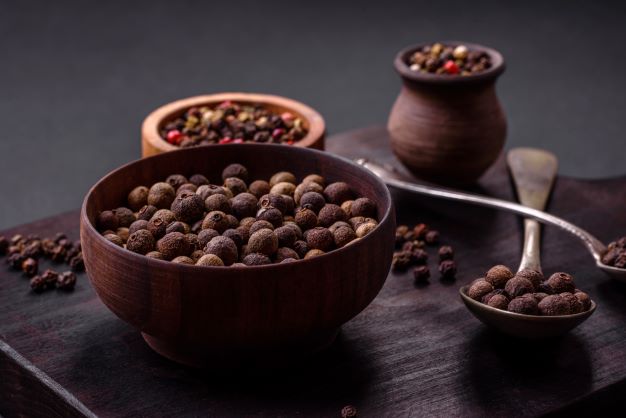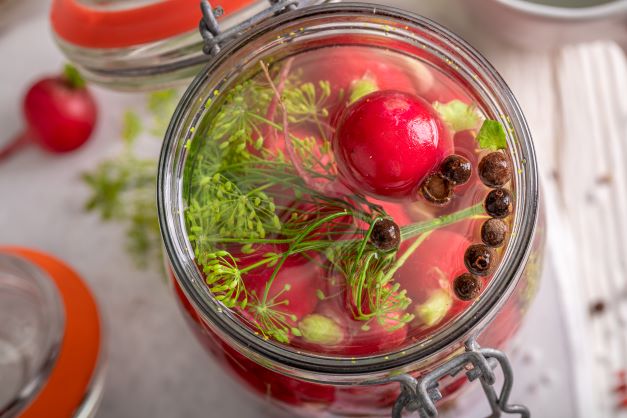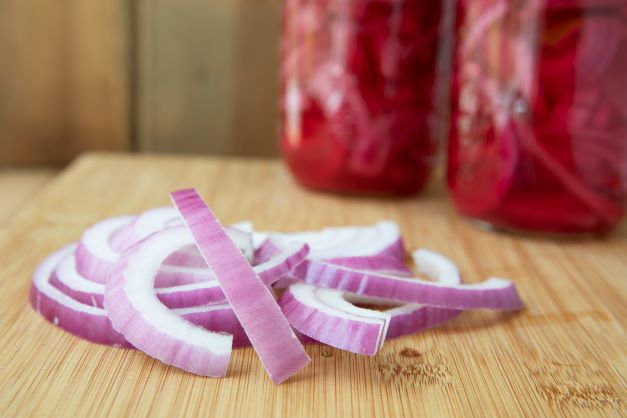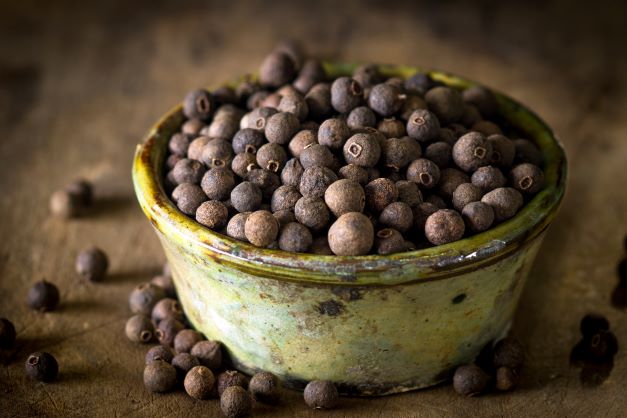Ienibaharul este cultivat în multe zone calde, dar este originar din Caraibe, America Centrală și Mexic. Boabele de ienibahar sunt fructele necoapte, uscate, ale arborelui Pimenta Dioica.
Gustul este călduros și savuros. Este un condiment versatil care aduce un plus de savoare atât în preparate dulci, cât și sărate.
Beneficiile pentru sănătate ale ienibaharului includ înlăturarea disconfortului gastro-intestinal, cum sunt: gazele, indigestia, constipația și balonarea.
Asortați ienibaharul cu ciocolată, carne de porc, sfeclă, morcovi, cartofi dulci, ceapă și dovlecei.
De unde provine ienibaharul?
Prima menționare apare în jurnalul de călătorie a lui Cristofor Columb în prima sa călătorie către America, în 1492. El le-a arătat localnicilor din Cuba câteva boabe de piper iar aceștia l-au îndrumat către locul în care creșteau de fapt arbori de ienibahar. Astfel, boabele de ienibahar au primit numele de ,,Pimenta” , care înseamnă piper în spaniolă.
În 1532, Felipe al IV-lea al Spaniei a primit vestea ca piperul poate fi găsit din abundența în Jamaica. Considerând că aceasta ar fi o bună oportunitate de a umple cuferele visteriei regale, Felipe a ordonat un transport urgent de piper, însă corabia s-a întors în Spania încărcată cu ienibahar, spre dezamăgirea investitorilor. Abia în secolul al XVII-lea, ienibaharul a fost folosit ca și conservant pentru carne și pește în călătoriile pe mare.
O notă importantă, chiar și dacă ienibaharul a fost adoptat ca și condiment la nivel global, el este încă folosit pentru aroma sa într-o arie largă de produse.

Beneficiile ienibaharului
Ienibaharul este un condiment ce își obține aroma bogată și parfumată din uleiul volatil de Eugenol, un cunoscut desensibilizant al durerii.
Eugenolul, totuși, nu este tot ceea ce conferă ienibaharului reputația de a fi un condiment vindecător. El conține mai mult de două duzini de compuși de compuși cu o varietate și mai mare de acțiuni vindecătoare, făcându-l un curativ universal.
Din punct de vedere medicinal, ienibaharul posedă calități antivirale și antibacteriene, făcându-l un luptător împotriva infecțiilor.
Are proprietăți analgezice și anestezice, deci poate oferi o ușoară ameliorare a durerii. Jamaicanii au fost primii care l-au folosit ca remediu popular pentru a ajuta la ameliorarea unei răceli, la calmarea durerii de stomac, la reglarea ciclului menstrual și la ameliorarea indigestiei, flatulenței și alte probleme digestive.
În timpul invaziei lui Napoleon din iarna lui 1812, soldații ruși au profitat de calitățile sale de încălzire, presărându-l în cizme pentru a îmbunătății fluxul de sânge și pentru a le menține picioarele calde.
Folosit ca ulei esențial, s-a descoperit că acțiunea sa antiinflamatoare ajută la ameliorarea durerii mușchilor și articulațiilor, precum și ale poliartritei reumatoide.
Păstrarea ienibaharului
Boabele de ienibahar trebuie să fie de culoare brună sau roșiatică, cu o suprafață aspră ce este cauzată de glandele uleiurilor volatile. Aroma trebuie să fie plăcută, asemănătoare cu cea a cuișoarelor iar boabele nu trebuie să prezinte urme de mucegai.
Diferența de mărime a boabelor nu afectează calitatea ienibaharului, însă atunci când folosim boabele întregi în mâncarea gătită este bine să le alegem pe cele mai mari pentru a da preparatului un aspect mai apetisant.
Ienibaharul trebuie păstrat sub formă de boabe întregi în recipienți ermetici, departe de căldură, lumină sau umiditate, putând fi păstrat astfel până la 3 ani.
Utilizarea ienibaharului
Ienibaharul poate fi întâlnit ca și condiment în multe rețete de plăcinte sau de biscuiți, în special în Marea Britanie sau America. Unii bucătari folosesc ienibaharul ca înlocuitor pentru cuișoare pentru că acesta conține eugenol, substanță ce poate fi găsită în cuișoare dar și în busuioc, motiv pentru care ienibaharul este inclus în rețete de sosuri de tomate sau barbeque.
Scandinavii, de exemplu, includ ienibaharul în tradiționalul hering marinat, dar și în rețete de murături, pate sau carne afumată.
O cantitate mică de ienibahar poate fi folosită pentru a da savoare unor preparate ca: legume rădăcinoase gătite la cuptor, mâncare de spanac, supă de legume, (mai ales în supa de roșii).

Ienibaharul se poate combina cu:
- frunze de dafin
- cardamon
- scorţișoară
- cuișoare
- semințe de coriandru
- chimion
- sămânță de fenicul
- ghimbir
- ienupăr
- semințe de muștar
- nucșoară
- paprika
- curcuma
Ienibaharul este inclus în mixuri de condimente pentru:
- Plăcinta cu dovleac
- Plăcinta cu mere
- Pudra de curry
- Rețete de murături
- Amestecuri pentru tagine
- Asesonarea cărnii
- Mixuri pentru băuturi (vin, cidru sau bere)
- Amestecuri chinezești pentru supe
Utilizare
- Legume rădăcinoase
- Spanac gătit
- Sosuri de tomate
- Pate și terine
- Supă de carne și de legume
- Carne la cuptor
- Sosuri și marinade
- Fructe de mare, în special scoici
- Murături
- Plăcinte
Rețetă rapidă de ceapă murată

Ingrediente:
- O ceapă roșie de mărime medie, curățată și tăiată în felii subțiri
- 8 boabe de piper
- 10 boabe de ienibahar
- 1/2 linguriță de oregano
- 3 căței de usturoi tocat
- 1/2 linguriță de sare
- 1/2 ceașcă de oțet de vin alb
Puneți ceapa într-o tigaie și acoperiți cu apa, apoi dați în clocot. Aruncați apa și clătiți cu apa rece pentru a opri gătirea cepei. Scurgeți ceapa pe un șervet apoi acoperiți-o într-un vas ceramic.
Puneți într-un mojar piperul, semințele de chimion și boabele de ienibahar apoi pisați până ce obțineți o pudră fină. Adăugați peste aceasta usturoiul, sarea și oregano, apoi amestecați bine. Turnați oțetul, amestecați și apoi turnați compoziția peste ceapă. În funcție de gust, puteți adăuga două, trei linguri de apă pentru a reduce concentrația otețului.
Ceapa va fi murată în 24 de ore și poate fi ținută la frigider timp de două săptămâni.








